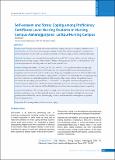Please use this identifier to cite or link to this item:
https://hdl.handle.net/20.500.14356/1876Full metadata record
| DC Field | Value | Language |
|---|---|---|
| dc.contributor.author | Shrestha, T | - |
| dc.date.accessioned | 2023-05-30T05:11:43Z | - |
| dc.date.available | 2023-05-30T05:11:43Z | - |
| dc.date.issued | 2013 | - |
| dc.identifier.citation | ShresthaT. (2014). Self-esteem and Stress Coping among Proficiency Certificate Level Nursing Students in Nursing Campus Maharajgunjand LalitpurNursing Campus. Journal of Nepal Health Research Council. https://doi.org/10.33314/jnhrc.v0i0.406 | en_US |
| dc.identifier.issn | Print ISSN: 1727-5482; Online ISSN: 1999-6217 | - |
| dc.identifier.uri | http://103.69.126.140:8080/handle/20.500.14356/1876 | - |
| dc.description | Original Article | en_US |
| dc.description.abstract | Abstract Background: Nursing requires high self-esteem and effective coping strategies for the quality of health services that they deliver. Self -esteem and stress coping mechanism developed during education period is foundation for professional practice. So, this study was conducted to identify self-esteem, coping activities, and their relationship. Methods: Descriptive cross sectional study was conducted among 287 PCL nursing students currently studying in different level in nursing campuses of the Institute of Medicine during June and July 2013. Self administered semi structured questionnaire and rating scales were used for the data collection. Results: Findings showed that 21 (7.31%), 194 (67.5%), and 67 (23.34%), students had have very high, high and moderate, self-esteem and only five (1.74%) have low self-esteem. The difference in self-esteem level was insignificant with the level of the students. Students most frequently used problem focused (3.36±0.54) followed by emotion focused (3.04±0.45) and avoidance coping activities (2.91±0.63). The relationship of use of coping activities and level of students was statistically insignificant. Self-esteem level had positive relation with problem focused and emotion focused coping activities (Pearson r: 0.114 and 0.118), though the correlation was significant with emotion focused coping activities only. Bicytopenia and pancytopenia were seen in two cases each of myelodysplastic syndrome. Chronic myeloid leukemia and Non-Hodgkin lymphoma showed anemia and pancytopenia respectively. Conclusions: Majority of PCL nursing students have high level of self-esteem. They used problem focused coping activities most however, use of it decreased with increased level of students. Students with high self -esteem used problem focused followed by emotion focused coping activities. Students should be encouraged to use problem focused coping activities. Keywords: PCL nursing students; self-esteem;stress coping. | en_US |
| dc.language.iso | en | en_US |
| dc.publisher | Nepal Health Research Council | en_US |
| dc.relation.ispartofseries | Sep-Dec, 2013;406 | - |
| dc.subject | PCL nursing students | en_US |
| dc.subject | Self-esteem | en_US |
| dc.subject | Stress coping | en_US |
| dc.title | Self-esteem and Stress Coping among Proficiency Certificate Level Nursing Students in Nursing Campus Maharajgunjand LalitpurNursing Campus | en_US |
| dc.type | Journal Article | en_US |
| local.journal.category | Original Article | - |
| Appears in Collections: | Vol. 11 No. 3 Issue 25 Sep - Dec, 2013 | |
Files in This Item:
| File | Description | Size | Format | |
|---|---|---|---|---|
| 406-Article Text-489-1-10-20140207.pdf | Fulltext Download | 513.65 kB | Adobe PDF |  View/Open |
Items in DSpace are protected by copyright, with all rights reserved, unless otherwise indicated.
